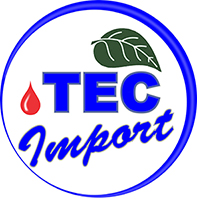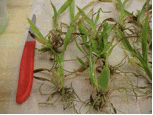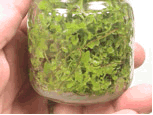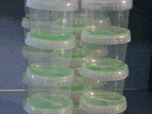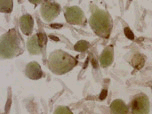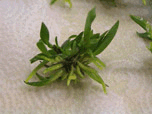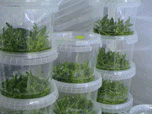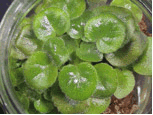Plant Preservative Mixture™ (PPM™) é a solução definitiva para a luta constante contra a contaminação microbiana, pelo ar, água e endógena.
PPM™ é um conservante/biocida, que efetivamente impede ou reduz a contaminação microbiana em cultura de tecidos vegetais.
Em doses ideais, PPM™ é um conservante/biocida extremamente eficaz, além de não prejudicar a germinação in vitro, a proliferação de Calos e a regeneração de Calos.
PPM™ é usado com êxito por instituições de pesquisa conhecidas, universidades, empresas comerciais, laboratórios privados e viveiros em todo o mundo, em uma ampla variedade de aplicações.
NOTA : PPM™ deve ser usado somente por profissionais e técnicos treinados e experientes em laboratório. É recomendável ler a FISPQ antes da utilização de PPM™.
References
V. M. Jimenez., J. Castillo., E. Tavares., E. Guevara., M. Montiel. 2006. In vitro propagation of the neotropical giant bamboo, Guadua angustifolia Kunth, through axillary shoot proliferation. Plant Cell Tiss. Organ Cult. (2006)86:389–395. ( full text )
Compton, Michael E. and Jennifer M. Koch. 1999. Influence of Plant Preservative Mixture (PPM) on adventitous organogenesis. In Vitro - Plant 35(3): 40-A.
Compton Michael E. and Jenniffer M. Koch 2001. Influence of Plant Preservative Mixture ( PPM ) on adventitious organogenesis in melon, petunia and tobacco. In Vitro Cell Dev. Biol.- Plant 37: 259-261.
Guri, Assaf Z. and Kishor N. Patel. 1998. Compositions and methods to prevent microbial contamination of plant tissue culture media. United States Patent 5,750,402 (Go to: and type in "Guri" in the search box in the US patent office patent website).
Guri, Assaf Z. 1998. Advances in Controlling Plant Tissue Culture Contamination Using the New Biocide PPM (Poster Presentation). XXXVII Congresso Viterbo 28-30 Septembre 1998, Societa Italiana di Fisiologia Vegetale.
Lunghusen, John. 1998. An effective biocide for plant tissue culture. Australian Horticulture (January 1998): 46-48.
M.P. Fuller and T. Pizzey., Vitro Cult. & Hort. Breeding, Eds. S. Sorvari et al. Acta Hort 560, ISHS 2001 "Teaching Fast and Reliable Plant Tissue Culture Using PPM and Brassicas".
M. Babaoglu & M. Yorgancilar, Plant Cell. Tissue. Organ. Culture 2000 440 : 31-34.
Niedz, Randall P. 1998. Using isothiazolone biocides to control microbial and fungal contaminants in plant tissue cultures. HortTechnology 8 (4): 598-601.
Renfroe, M.H., J.T. Hitt, J.P. McNicholas, J.A. Priday and V.B. Delgaiza. 1999. Comparison of laboratory and field Portulaca culture establishment techniques. In Vitro - Plant 35(3): 53-A.
Sandra M. Reed J. Environ., Hort. 2000 18(1) 34-39
Stiff, Carol M. 1998. Plant tissue culture for the classroom and home: A manual to accompany the Kitchen Culture Kit. Kitchen Culture Kits, Inc. 72 p.
Stiff, Carol M. 1999. Successful plant tissue culture in the classroom or home. In Vitro - Plant 35(3): 53-A.
Stiff, Carol M. 1999. Plant tissue culture for the classroom and home: An interactive CD with lessons, lectures, labs, and technical manual. Kitchen Culture Kits, Inc.
Todas as plantas mostradas acima, foram cultivadas em meio contendo 1-2 ml PPM™ por litro. Clique em uma miniatura para ver a imagem em tamanho normal.
|
